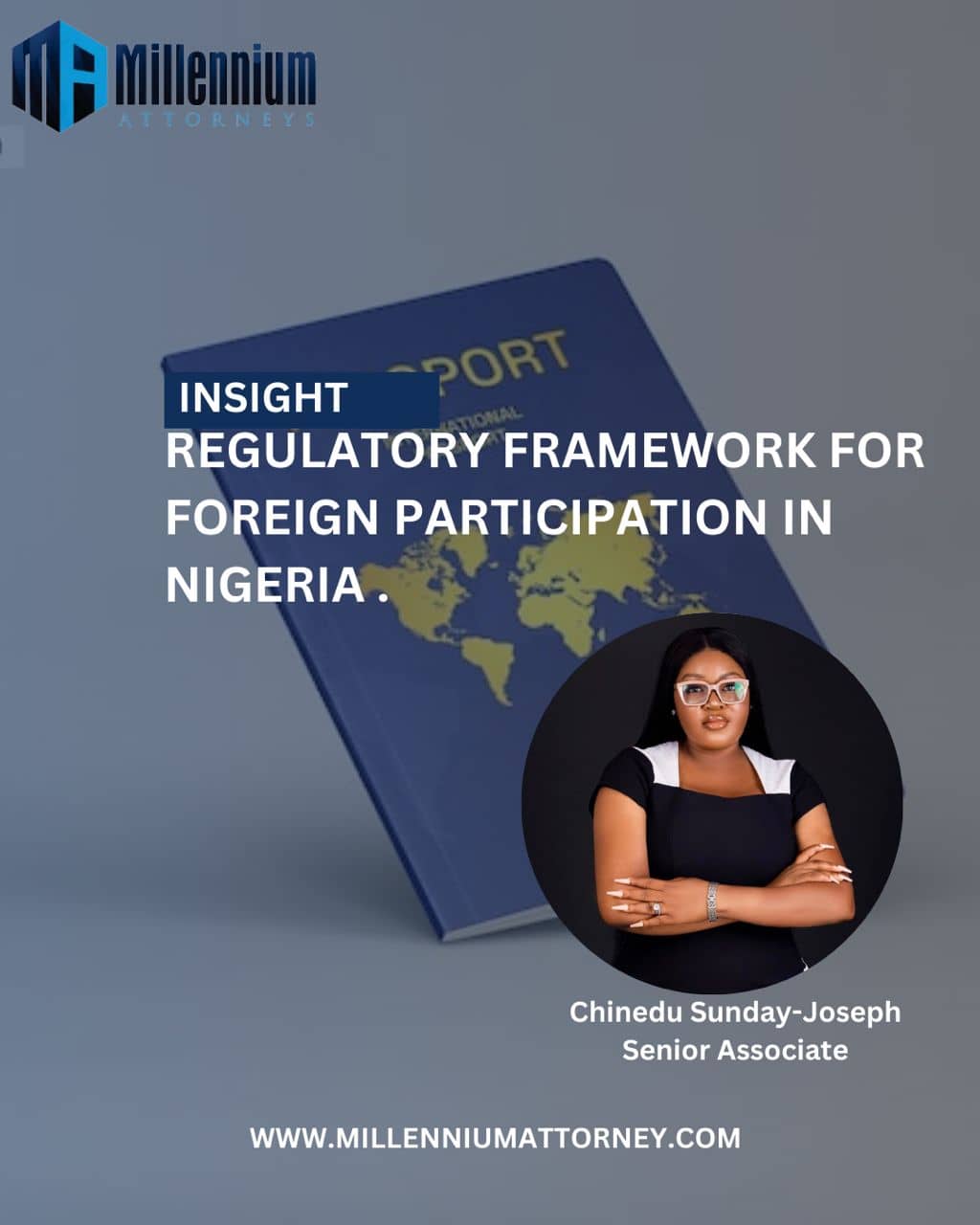Introduction
Nigeria, as Africa’s largest economy and one of its most populous nations, presents significant opportunities for foreign investors. However, engaging in business within its borders requires a comprehensive understanding of the regulatory framework governing foreign participation. The regulatory landscape in Nigeria encompasses a range of laws, policies, and institutional frameworks that govern how foreign entities/ individuals can participate in Nigeria. This article delves into the key components of Nigeria’s regulatory framework for foreign participation, providing a detailed overview of the requirements, processes, and compliance measures that foreign investors must undertake.
Corporate Affairs Commission
In order to establish and operate a company in Nigeria as a foreigner, it is essential for a foreign company to complete incorporation process with the Corporate Affairs Commission (CAC). The CAC serves as the regulatory authority responsible for overseeing the incorporation of companies and the overall management of corporate affairs. CAC is a stator body established by Companies and Allied matters act 1990 (now 2020).
Prior to 2022, the minimum share capital requirement for foreign participation in Nigeria was Ten Million Naira (N10,000). However, in 2022, the Ministry of Interior introduced revisions to the guidelines governing expatriate quota administration, leading to an increase in the minimum share capital to One Hundred Million Naira (N100,000,000). According to the updated guidelines, a foreign company wishing to conduct business in Nigeria is eligible for a Business Permit only if it falls under the category of wholly foreign-owned or joint venture companies with foreign participation and maintains a minimum paid-up capital that is adequate to commence business.
The registration requirements with the CAC typically encompass the following:
- Submission of the proposed company name and a clear outline of its business objectives.
- Provision of comprehensive details pertaining to the foreign company’s directors and shareholders.
- Declaration of the registered address and the primary place of business within Nigeria.
- Submission of the Memorandum and Articles of Association, outlining the company’s internal regulations and structure.
- Providing the particulars of the company secretary.
Upon incorporation, the company shall be required to issue share certificate to its shareholders and file annual returns. However, companies are exempted from filing annual returns with CAC for the first 18 months post-registration.
Tax Compliance
Upon registration of the company, the company shall be required to update its Tax Identification Number with FIRS and also obtain Value added tax certificate. This certificate grants the company a right to receive VAT Fees at the rate of 7.5% from its customers. The VAT fee collected on behalf of the Firs is remitted on a monthly basis through the FIRS online portal, and Company Income Tax (CIT) when the company makes twenty-five million naira and above annually. Kindly note that the CIT is filled annually.
Where the company fails to file VAT monthly, the company shall be penalized in the sum of fifty thousand naira for the first month of default and twenty-five thousand naira for every subsequent month of default.
Furthermore, a company is required to withhold tax at the rate of 10% on all profits and dividends paid to its investors. Where the company fails to do so it would be responsible to pay the tax from its profits, as opposed to deducting it from its investors’ profit.
Nigerian Investment Promotion Commission (NIPC)
The NIPC promotes and coordinates investments in Nigeria. Foreign companies are required to register with the NIPC to enjoy the benefits and incentives provided to foreign investors. The NIPC plays a pivotal role in promoting and facilitating investments in Nigeria. It is mandatory for foreign companies to register with the NIPC to avail themselves of the benefits and incentives that are offered to foreign investors. Below is a list of the requirements for registering with the NIPC:
- Company name and physical address.
- Contact details, including phone number and email address.
- Registration Certificate Number (RC No).
- A brief description of the company’s business activities.
- Country of origin of the investment.
- Factory location, if different from the company’s registered address.
- Proposed date of commencement of business operations.
- The proposed investment value, denominated in Naira, US dollars, or British pounds.
- The anticipated number of employees to be employed.
- The authorized equity structure of the organization.
- Shareholding pattern of the company.
- Names and contact information, including phone numbers, of the company’s directors.
- Details of the designated contact person, including name, address, phone number, email, and job designation.
Compliance with these requirements is vital for successful registration with the NIPC, enabling your company to enjoy the privileges available to foreign investors in Nigeria.
Special Control Unit against Money Laundering (SCUML)
SCUML, under the Economic and Financial Crimes Commission (EFCC), is responsible for ensuring compliance with anti-money laundering and counter-terrorism financing regulations. Registration with SCUML is essential to meet these obligations. Please see below the requirements for registration;
- Incorporation documents
- Means of identification of one director
- BVN of one director
- Proof of address
Other Considerations
- Trademark: There is a need to protect your intellectual property (trademark and logo) with the ministry of interior, however, compliance with this provision is optional.
- National Office for Technology Acquisition and Promotion (NOTAP): The company will be required to register an agreement with the National Office for Technology Acquisition and Promotion (NOTAP) were the company enters an agreement for the transfer of technology or use of intellectual property rights or for the provision of managerial/supervisory assistance.
- The National Agency for Food and Drug Administration and Control (NAFDAC): It regulates the quality and safety of food, drugs and other regulated products consumed by Nigerian consumers (whether locally or internationally produced and whether they emanated from conventional or biotechnological processes) and protection from health risks. Thus to operate fully the company would have to comply with the registration requirements of Nafdac.
- Standard Organization of Nigeria (SON): It is the body in charge of standardization of products in Nigeria. They are in charge of all the products, processes and scientific study of measurement standards in Nigeria. The primary responsibility of Standard Organisation of Nigeria is to make sure that products that are locally manufactured in Nigeria have the required level of satisfaction desired by consumers.
- Federal Ministry of Agriculture & Rural Development (FMARD): It is responsible for developing the agriculture sector of the Nigerian economy, with a view to growing the sector, driving income growth, accelerate food and nutrition security, generating employment and transforming Nigeria into a leading global food market, through the commodity value chain concept of the Agricultural Transformation Agenda (ATA). The Federal Ministry of Agriculture and Rural Development (FMARD) is a Ministry of the Nigerian government that regulates agricultural research, agriculture and natural resources, forestry and veterinary research all over Nigeria. The Ministry has the responsibility of optimizing agriculture and integrating rural development for the transformation of the Nigerian economy, with a view to attaining food security and positioning Nigeria as a net food exporter for socio-economic development.
- Nigerian Custom Service: The Nigerian Custom Service is the body charged with the responsibility of ensuring the products that come in or go out of the Country meets the required standards.
Conclusion
In conclusion, it is important for foreign companies seeking to establish a presence in Nigeria to adhere to the legal and regulatory framework outlined above. For the purpose of emphasis, the principal regulatory entities overseeing these requirements include the CAC, FIRS, NIPC, and SCUML. Also, they are supplementary regulatory bodies such as NSITF, ITF, and NOTAP that play integral roles in ensuring compliance and facilitating foreign investments in the country. Additionally, they are industry specific regulators such as the Central Bank of Nigeria (CBN), Nigeria Communications Commission (NCC), Nigeria Civil Aviation Authority (NCAA) depending on the sector of business the foreign companies would have to contact a lawyer who would advise on the regulators in the sector. We at Millennium Attorneys are here to help you kickstart the process.


